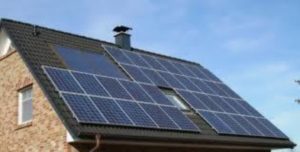Mark Diesendorf answers questions recently submitted to Quora on the economics of renewable energy
Editor
Q: Which is the cheaper option for individual customers: renewable energy or traditional electricity?
In many parts of the world, rooftop solar PV without batteries is cheaper than buying electricity from the grid. For example, in my home town, Sydney Australia, solar electricity costs about one-third of buying retail electricity from the grid. Conditions apply to this statement: (1) sufficient sunshine on the roof; (2) sufficient demand for electricity in the daytime to make the investment worthwhile.
At present, most household and small business owners of rooftop PV don’t have batteries, which are still expensive. They use the grid as back-up for overcast periods lasting days. However, with the construction of gigafactories making solar modules and the current growth in demand for batteries for both vehicles and solar electricity systems, battery prices will inevitably fall.

Q: If fossil fuels are no longer used, will economies be more stable?
Except for bioenergy, once renewable energy systems have been constructed, there can be no escalation in fuel costs. Renewable energy sources, which depend directly or indirectly on the Sun, will be available for billions of years. In contrast, as fossil fuels become scarcer and more difficult to extract, energy from fossil fuels becomes inevitably more expensive.
Renewable energy systems have several other advantages over fossil fuels with respect to facilitating a stable economy and society: they produce much less air and water pollution, land degradation and respiratory disease. As batteries become cheaper, rooftop solar and other forms of renewable electricity will allow households and businesses to become more independent.
Q: For a developing country, which is the better energy option – renewables or nuclear energy?
If the developing country has renewable energy resources such as solar and wind, then they are by far the least expensive, safest and (with a couple of exceptions) the most environmentally sound. The exceptions are (i) some
large hydro-electric dams, that flood fertile valleys producing the greenhouse gas methane and also displace many people; and (ii) some forms of bio- energy that involve clearing native forests, destroying biodiversity and producing greenhouse gases. The efficient use of energy is the key partner for renewable energy.
Nuclear energy is at least double the price of wind and solar PV, contributes to the proliferation of nuclear weapons, imposes the risk of rare but potentially devastating accidents and generates radioactive wastes that need to be managed for hundreds of thousands of years. Existing nuclear power stations are too big for the electricity grids of many developing countries. Thorium reactors, fast breeders and small modular rectors are not commercially available and may not become so in the foreseeable future.
Q: Despite its obvious fossil-free energy advantage, why are the number of nuclear power plants decreasing?
Although it is now heavily subsidised, nuclear energy cannot economically compete with on-shore wind and solar PV, whose subsidies are nowadays
small and decreasing in most countries, and are zero in several South American countries. The levelised cost of energy from nuclear power is typically about double that of on-shore wind and solar, and even higher than off-shore wind in northern Europe. The market is a good indicator of relative economics. In 2017 global investment in nuclear power was
US$45 billion, while global investment in renewable electricity was US$310 billion (Source: REN21 report).
 Dr Mark Diesendorf is an Australian academic known for his work in sustainability and renewable energy, and is attached to the UNSW.
Dr Mark Diesendorf is an Australian academic known for his work in sustainability and renewable energy, and is attached to the UNSW.



























